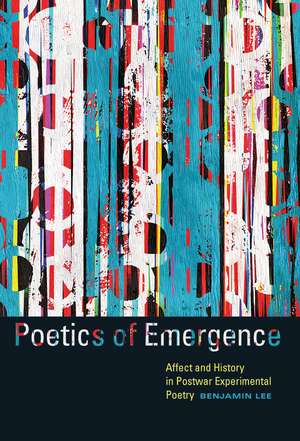Poetics of Emergence: Affect and History in Postwar Experimental Poetry: Contemp North American Poetry
Autor Benjamin Leeen Limba Engleză Paperback – 14 iul 2020
Frank O’Hara and fellow experimental poets like Amiri Baraka, Diane di Prima, and Allen Ginsberg offer us a set of perceptive responses to Cold War culture, lyric meditations on consequential changes in U.S. social life and politics, including the decline of the Old Left, the rise of white-collar workers, and the emergence of vernacular practices like hipsterism and camp. At the same time, they offer us opportunities to anatomize our own desire for historical significance and belonging, a desire we may well see reflected and reconfigured in the work of these poets.
Preț: 532.97 lei
Preț vechi: 627.02 lei
-15% Nou
Puncte Express: 799
Preț estimativ în valută:
101.99€ • 106.75$ • 84.88£
101.99€ • 106.75$ • 84.88£
Carte indisponibilă temporar
Doresc să fiu notificat când acest titlu va fi disponibil:
Se trimite...
Preluare comenzi: 021 569.72.76
Specificații
ISBN-13: 9781609386979
ISBN-10: 1609386973
Pagini: 190
Ilustrații: 1 b&w photo
Dimensiuni: 152 x 229 x 13 mm
Greutate: 0.27 kg
Ediția:1
Editura: University of Iowa Press
Colecția University Of Iowa Press
Seria Contemp North American Poetry
ISBN-10: 1609386973
Pagini: 190
Ilustrații: 1 b&w photo
Dimensiuni: 152 x 229 x 13 mm
Greutate: 0.27 kg
Ediția:1
Editura: University of Iowa Press
Colecția University Of Iowa Press
Seria Contemp North American Poetry
Notă biografică
Benjamin Lee is associate professor of English at the University of Tennessee, Knoxville. This is his first book.
Descriere
Experimental poetry responded to historical change in the decades after World War II, with an attitude of such casual and reckless originality that its insights have often been overlooked. Poetics of Emergence argues that to ignore the scenes of self and the historical occasions captured by experimental poets during the 1950s and 1960s is to overlook a rich and instructive resource for our own complicated transition into the twenty-first century.















